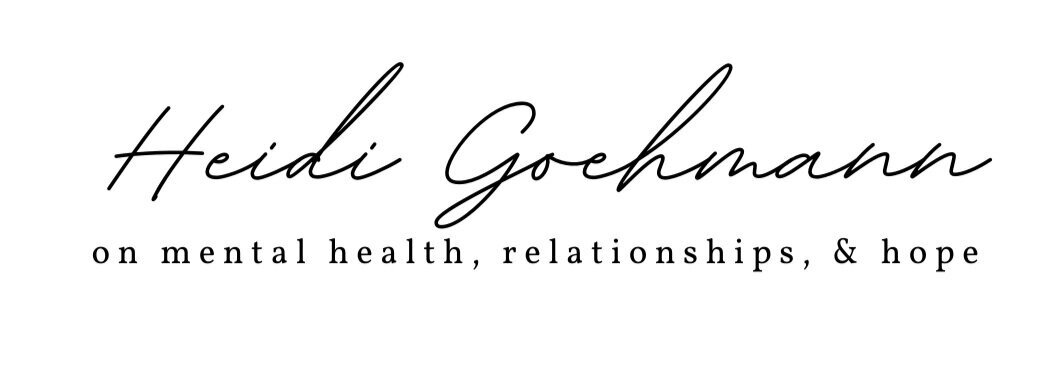I'd Rather Have You
When I was a teenager I kept one of the best tricks of adolescence in my back pocket. Whenever I did something deserving of discipline and figured out that my parents were onto my game, I’d push all my mom’s buttons. All the buttons, not just a couple. A couple buttons just got you deeper in trouble, but if you pushed all the buttons, then she got a bit rage-y. I’ve been there as a mom myself. One can hold themselves together on this road of parenting for only so long, pressing down the frustrations of the day and the household until it all kind of boils over. The trick I figured out as a teenager, though, was that if I got my mom to boil over, then whatever I had done was no longer the focus; instead I could cast blame and shame onto my mom for her anger.
It was a terrible, dirty, no-good trick and the one that most of us used as teenagers, whether we realized it at the time or not. I’m pretty sure that sometimes we use it as adults. Growth is a process and while we’re justified by faith in an instant because Jesus died for us, forgives us, and loves us no matter our mess, we’ll be messy until the day we die. I think it’s significant that God doesn’t solve our messes as soon as our lives are marked by faith. His plans are long-term, much like guiding a child, then adolescent, and then teen into adulthood, rather than instantly solving all the mess and muck. He sees us as we are and says,
“I’d rather have you, than perfect.”
In Jesus, perfect is real and true and holy. God sees me through the Jesus-lens of course, but knowing me deeply means not only knowing me through Jesus’ perfection, but also seeing all the bits past that.
“I’d rather have you, than perfect.”
This is significant as we enter week four of our study on foolishness and salvation. I have been foolish. My teenage years a few paragraphs back attest to my foolishness, and I’m sure you could look at my day today and see its evidence as well. We are foolish people, loved by a very good and grace-filled God. The answer to our foolishness is His salvation, and not the someday breed of salvation. That’s good salvation, but in regard to our foolishness, we also need assurance of today salvation has come to my house, like Zacchaeus (the wee little man) shouted out to the world when he experienced it (on a road!) in Luke 19.
What does salvation for our foolishness look like today?
For the most part, I think it looks like this:
“I’d rather have You too, Lord.”
If you open up the Bible to Genesis 19, you’ll find the story of a whole town that had big issues and big messes. Sodom and Gomorrah were so far gone that the entire town, not just one random hardened criminal, tried to beat down Lot’s gate in order to violate his two guests for the night. Violence in our news and our communities is disturbing. It should be disturbing. May it always be disturbing to us. Sodom and Gomorrah is what you get when violence is no longer disturbing.
God saves Lot and his whole family from a community wrecked with violence and selfish greedy lust. Lot’s family famously flees onto the road outside of the town before Sodom is decimated by God. God destroys Sodom and Gomorrah because it is sinful, but there is more to the destruction. If we look at it, we’ll get to know God a little better. Do you know what sin does? It makes the places we live and gather unsafe for all of us. Our own foolishness, which may not look as flagrant as Sodom’s, has the same effect – it makes the world, our homes, our churches, our relationships a little less safe, or a lot less safe, for all those around us.
In the Biblical account, God offers Lot safety in the hill country. Lot asks for a different road. Lot asks for the road to the nearest tiny little town. This is basically Lot saying, “I mean it’s very little, I’m so little, can it really be all that bad, Lord?” Lot says to the Lord with his request and his actions:
“I’d rather have that, than You, Lord.”
God is gracious to us, even in our foolishness, which leaves me flabbergasted by His grace every day. God grants Lot’s request. And still we have the story of a woman, a glance, and a pillar of salt. When Lot’s wife looked back at the towns, she was disobedient, she also may have been mourning, she may have been lost in pain and the turmoil of life change, but deep down her message to God was this:
“I’d rather have that, than you, Lord.”
That’s the issue. That’s the real foolishness. Just as foolish as violence and hatred and hurt, is choosing some one, some thing, or some life over God.
I want You, Lord.
I choose You, Lord.
I am Yours, Lord.
I’d rather have You.
Up Next: Life Interrupted
In the Meantime: Catch the video for this week of study - Dumb Decisions

